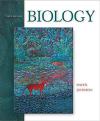 |  Biology, 6/e Author Dr. George B. Johnson,
Washington University
Author Dr. Peter H. Raven,
Missouri Botanical Gardens & Washington University
Contributor Dr. Susan Singer,
Carleton College
Contributor Dr. Jonathan Losos,
Washington University
Sex and Reproduction
Answers to Review Questions|
Chapter 59 (p. 1214)
1. Oviparity is reproduction through laying eggs. In ovoviviparity, the eggs hatch inside the mother, simulating a live birth. Truly viviparous animals are born alive.
2. Monotremes are oviparous. Marsupials have embryos born very underdeveloped and continue development in the pouch; in placentals, all development takes place in the mother’s body and internal nourishment is provided by means of a network of blood vessels called the placenta.
3. Seminal vesicles contribute a fructose-rich nutrient to the semen, the fluid medium in which sperm travel. The prostate gland is responsible for approximately 60% of the volume of semen. The bulbourethral glands secrete a lubricant to facilitate sexual intercourse.
4. Ova start their meiosis when they are first formed, during embryological development. The first meiotic division is completed during the follicular phase in the Graafian follicle.
5. The granulose cells secrete estrogen, which feeds back to the hypothalamus to stop FSH production; estrogen also causes the uterine lining to proliferate.
6. The four periods are excitement, plateau, orgasm, and resolution. In both the female and the male, during excitation there is increased heartbeat, blood pressure, respiration, and vasodilation, as well as increased sensitivity in the nipples and genital tissues. The male experiences vasocongestion in the penis, resulting in erection. The female experiences increased circulation with swelling in the labia and the clitoris, and the vaginal walls become moist and its muscles relax.
7. Birth control pills prevent the maturation of the egg by providing hormonal signals that ovulation has already taken place.
|
|



 2002 McGraw-Hill Higher Education
2002 McGraw-Hill Higher Education

 2002 McGraw-Hill Higher Education
2002 McGraw-Hill Higher Education